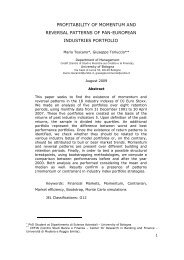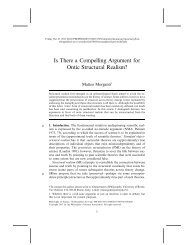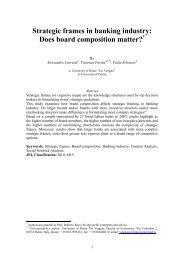large debt financing syndicated loans versus corporate bonds
large debt financing syndicated loans versus corporate bonds
large debt financing syndicated loans versus corporate bonds
Create successful ePaper yourself
Turn your PDF publications into a flip-book with our unique Google optimized e-Paper software.
5.1.2 Renegotiation and liquidation concerns<br />
European firms with higher levels of fixed assets are more likely to borrow from the<br />
<strong>syndicated</strong> loan market. Fixed assets are indeed easier to pledge in the event of<br />
<strong>syndicated</strong> loan borrowing than borrowing via the public markets. Fixed assets,<br />
however, can also be interpreted as a proxy for liquidation value (Esho et al. (2001)<br />
and Johnson (1997)). Compared with <strong>syndicated</strong> <strong>loans</strong>, <strong>bonds</strong> usually involve a <strong>large</strong>r<br />
number of investors, which makes it difficult to renegotiate the terms of a <strong>debt</strong><br />
contract, as consensus is needed. Indeed, lenders in public <strong>debt</strong> markets are less able<br />
than banks to distinguish, on account of information asymmetries, between the<br />
optimality of liquidating or allowing the project to continue (Berlin and Loeys<br />
(1988)). This is often reflected in the <strong>debt</strong> contracts of <strong>corporate</strong> <strong>bonds</strong> in the form<br />
either of covenants that are too harsh (which may result in the premature liquidation<br />
of profitable projects), or of covenants that are too lenient (which may allow<br />
unprofitable projects to continue). In the case of <strong>syndicated</strong> <strong>loans</strong>, more stringent<br />
monitoring also helps to lower inefficient liquidation processes, as the creditors have<br />
more accurate information on the characteristics of borrowers. Overall, as the value of<br />
project liquidation falls, the benefit of efficient liquidation of unprofitable projects<br />
drops and firms are more likely to use public <strong>debt</strong>, thereby lowering monitoring costs<br />
(Esho et al. (2001)).<br />
18 ECB<br />
Working Paper Series No 1028<br />
March 2009

















